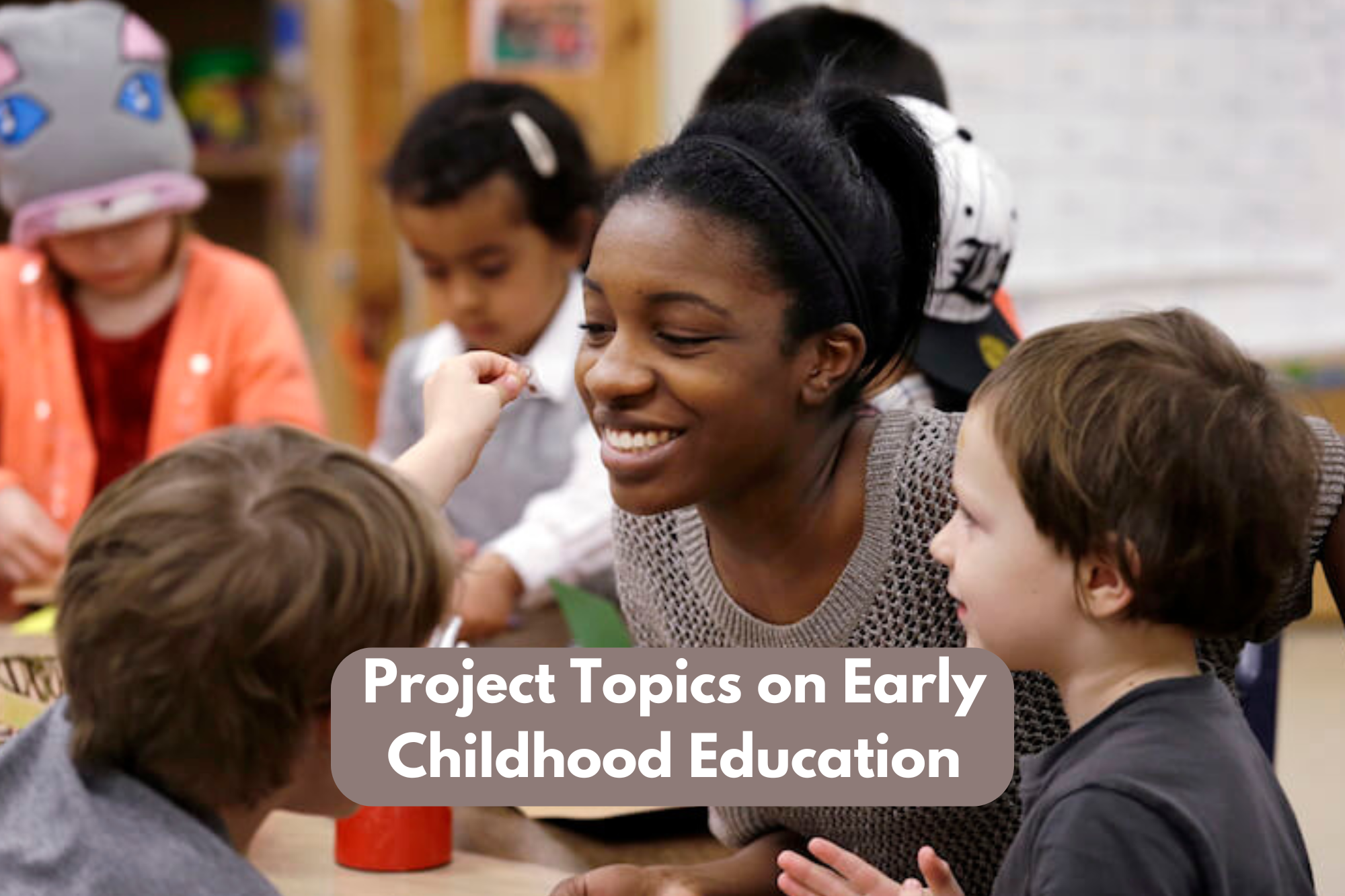Share this Post
Early Childhood Education (ECE) plays a pivotal role in shaping the academic, social, and emotional development of children. This foundational stage of learning is essential for preparing young learners for future educational challenges.
In Nigeria, increasing research on ECE addresses issues such as teaching methods, accessibility, and child development.
Below are ten project topics tailored to the field of early childhood education, each designed to explore critical aspects of this field:
1. The Impact of Early Childhood Education on Cognitive Development
- Focus of the Study: Understanding how structured learning environments in ECE influence cognitive skills such as memory, problem-solving, and reasoning.
- Significance: This research highlights the importance of early learning experiences in preparing children for advanced academics.
2. Parental Involvement and Its Effect on Pupils’ Academic Performance
- Focus of the Study: Examining how parents’ engagement in school activities and homework affects the performance and behavior of children in ECE.
- Significance: Offers strategies for fostering a strong partnership between schools and parents.
3. Effect of Play-Based Learning on Academic and Social Skills
- Focus of the Study: Exploring the use of play as a medium for teaching and its role in developing social, emotional, and intellectual skills in children.
- Significance: Emphasizes the importance of incorporating play into ECE curriculums.
4. Challenges in Implementing Early Childhood Education Policies in Nigeria
- Focus of the Study: Investigating policy barriers such as inadequate funding, lack of infrastructure, and limited teacher training in Nigeria’s ECE sector.
- Significance: Proposes actionable solutions for government and stakeholders to address these challenges.
5. Gender Dynamics in Early Childhood Education: Teachers’ and Pupils’ Perspectives
- Focus of the Study: Understanding how gender roles influence learning experiences and teacher-student interactions in ECE classrooms.
- Significance: Promotes gender-sensitive teaching practices and equal opportunities for boys and girls.
6. The Role of Technology in Early Childhood Education
- Focus of the Study: Investigating the integration of digital tools like tablets and educational apps in ECE classrooms.
- Significance: Highlights opportunities and challenges in adopting technology for young learners in Nigeria.
7. Influence of Class Size on Academic Performance in ECE Settings
- Focus of the Study: Analyzing the effect of large class sizes on teaching effectiveness, individualized attention, and student outcomes.
- Significance: Identifies the ideal teacher-student ratio for improving learning experiences.
8. Effect of Socioeconomic Status on Access to Early Childhood Education
- Focus of the Study: Examining how family income, parental education, and location impact children’s access to quality ECE in Nigeria.
- Significance: Provides recommendations for reducing educational disparities between socioeconomic groups.
9. Enhancing Literacy Skills through Storytelling in Early Childhood Education
- Focus of the Study: Evaluating the role of storytelling as a tool to improve language skills, vocabulary, and comprehension among young learners.
- Significance: Promotes the use of creative methods to foster literacy in ECE.
10. Comparative Study of Public and Private Early Childhood Education in Nigeria
- Focus of the Study: Comparing teaching methodologies, resources, and performance outcomes between public and private ECE institutions.
- Significance: Offers insights into improving the overall quality of ECE in Nigeria.
Other Potential Topics in Early Childhood Education
- 11. The Role of Nutrition in Early Childhood Development: Examines how adequate nutrition impacts children’s learning and physical development.
- 12. The Use of Indigenous Languages in ECE Classrooms: Evaluates the effectiveness of teaching in native languages to enhance comprehension in young learners.
- 13. The Impact of Teacher Qualifications on Learning Outcomes in ECE: Studies how teacher training and expertise affect academic performance.
- 14. Behavioral Challenges in Early Childhood Education: Investigates common behavioral issues in classrooms and effective intervention strategies.
- 15. Inclusion of Children with Special Needs in ECE: Explores methods for integrating children with disabilities into mainstream classrooms.
Conclusion
Early childhood education lays the groundwork for lifelong learning and development. These project topics offer a comprehensive exploration of critical areas in ECE, ranging from policy challenges to classroom practices.
By addressing these issues, researchers can contribute to improving the quality, accessibility, and effectiveness of early education in Nigeria, fostering a brighter future for the nation’s children.
FAQs on Project Topics for Early Childhood Education
1. What are the key factors to consider when selecting a project topic in early childhood education?
When choosing a project topic in early childhood education, consider the following:
- Relevance to current issues in education.
- Availability of research materials and resources.
- Potential impact of the study on teaching practices or policy.
- Your personal interest and expertise in the topic.
- The feasibility of conducting the research within the given timeframe.
2. How can I make my research on early childhood education stand out?
To make your research unique:
- Focus on addressing gaps in existing studies.
- Incorporate practical recommendations for educators and policymakers.
- Use real-life examples, case studies, or fieldwork data to support your arguments.
- Explore innovative topics such as technology integration or inclusive education.
3. What are the challenges of conducting research in early childhood education?
Some common challenges include:
- Difficulty accessing accurate data due to young participants.
- Limited availability of resources or materials in certain research areas.
- Resistance from schools or parents when involving children in studies.
- Balancing academic rigor with ethical considerations for working with young learners.
4. What tools and methods are commonly used in early childhood education research?
Researchers often use:
- Observations: To study children’s behavior and interactions in natural settings.
- Interviews: With teachers, parents, and administrators for qualitative insights.
- Questionnaires and Surveys: To gather data from a larger group of participants.
- Case Studies: For in-depth exploration of specific schools, policies, or practices.
5. How does research in early childhood education contribute to Nigeria’s educational system?
Research in early childhood education helps:
- Identify challenges like lack of resources or teacher training.
- Improve teaching practices and curriculum design.
- Provide data for developing policies to enhance access to quality education.
- Advocate for increased funding and attention to foundational learning.






Your article helped me a lot, is there any more related content? Thanks!